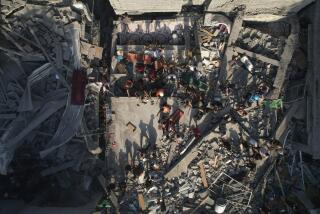Palestinian Suicide Attack Injures 16 at Tel Aviv Eatery
- Share via
JERUSALEM — A suicide bomber blew himself up at a fast-food restaurant in Tel Aviv on Thursday, injuring at least 16 people, Israeli police said.
The militant group Islamic Jihad claimed responsibility for the midafternoon explosion near a former bus station previously targeted by Palestinian bombers.
Authorities said the bomber set off explosives inside a restaurant specializing in shawarma, a roasted-meat dish, and falafel. Police said the eatery, in a working-class neighborhood, did not have a security guard at the door, unlike many Israeli business establishments. Witnesses said the male bomber carried a large black duffel bag and pretended to be selling razors.
Danny Mevorah, 36, who works at a shop next door, said he ran into the restaurant after the blast and pulled out stunned and injured employees. The ceiling dangled in pieces, flecked with blood.
Palestinian militants last struck inside Israel on Dec. 5, in a suicide bombing that killed five Israelis outside a shopping mall in the coastal city of Netanya. Islamic Jihad also claimed responsibility for that attack and for the other four bombings inside Israel last year.
The latest attack comes less than a week before Palestinians are to elect a new parliament, the first such vote since 1996. The ruling Fatah movement led by Palestinian Authority President Mahmoud Abbas faces a stiff challenge in Wednesday’s balloting from Hamas, the militant Islamic group making its first run for legislative seats.
Abbas has been under pressure from Israel and the United States to take firm action against armed militias. But the Palestinian leader has sought instead to persuade the fighters to hold their fire against Israel.
Last year, Abbas brokered a tentative cease-fire observed by most of the militant groups, including Hamas. But that agreement expired Dec. 31, and none of the groups have formally renewed the pledge. Islamic Jihad did not observe the truce.
David Baker, an aide to the Israeli prime minister, said the bombing was “once again a vivid reminder of the Palestinian Authority’s utter refusal to take any step to prevent terror against Israel .... We saw the results of this on the streets of Tel Aviv today.”
Palestinian officials accused the attack’s planners of seeking to undermine next week’s vote.
“Its timing is dangerous and undermines Palestinian interests to a large extent,” Cabinet Secretary Samir Huleileh said. “It also undermines the democratic process that will take place in a few days.”
Meanwhile, Israeli Prime Minister Ariel Sharon remained comatose in a Jerusalem hospital, where officials have listed him in critical but stable condition after a massive stroke two weeks ago.
His leadership duties have passed to Vice Prime Minister Ehud Olmert, who may be carefully watched by Israelis for his responses to any Palestinian violence during the weeks before Israeli national elections.
Olmert also has taken over as acting leader of the centrist Kadima movement that Sharon formed in November after leaving the conservative Likud Party. Sharon was joined by more than a dozen Likud ministers and lawmakers, including Olmert, and by some key members of the left-leaning Labor Party.
Kadima is widely favored to win in the voting set for March 28.
A poll published Thursday in the daily newspaper Yediot Aharonot showed Kadima winning 43 of the 120 seats in the Israeli parliament, or Knesset. Labor was shown trailing with 21 and Likud with 12.
In other developments, Israeli media reported Thursday that the government planned to deploy nearly 4,000 soldiers and border police officers to evacuate Jewish settlers from an enclave in the volatile West Bank town of Hebron and from an illegal settlement outpost in the northern West Bank.
Olmert on Thursday instructed authorities to remove hard-line settlers who have taken over a Hebron market and to demolish nine houses built without authorization in an outpost known as Amona. The order was seen as a sign that Olmert may assume a tougher posture against unsanctioned settlements than was taken by Sharon.
Olmert, saying the government had been lax in reining in settlers who break the law, ordered defense officials to prepare a plan for emptying about two dozen illegal outposts that Israel had promised to dismantle under the U.S.-backed peace plan known as the “road map.”
Times special correspondent Tami Zer in Tel Aviv contributed to this report.
More to Read
Sign up for Essential California
The most important California stories and recommendations in your inbox every morning.
You may occasionally receive promotional content from the Los Angeles Times.













